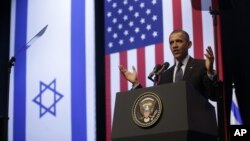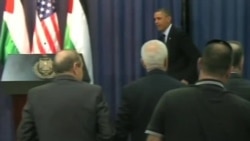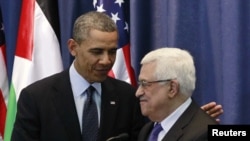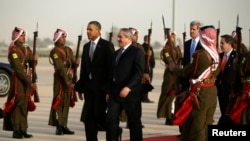JERUSALEM —
President Barack Obama leaves Israel on Friday, going to Jordan on the next stop of his Mideast trip. Obama told Israelis on Thursday that Palestinians deserve an independent state and Israel's future depends on forging a lasting peace.
Punctuated by frequent applause, and at one point interrupted by a heckler, the speech was aimed at prompting Israel's younger generation to consider their future in an increasingly unstable region.
Obama suggested that future must include risk-taking to achieve lasting peace with an independent and viable Palestinian state living alongside a secure Israel.
"I believe that peace is the only path to true security," he said. "You have the opportunity to be the generation that permanently secures the Zionist dream, or you can face a growing challenge to its future."
Obama said it would be easier for him to offer unconditional support for Israel. Instead, he offered his advice as a friend deeply concerned about and committed to Israel's future.
He said Israel faces sweeping political changes in the Arab world and changing demographics in the Middle East.
By committing to a lasting peace with Palestinians, Israelis could reverse an "undertow of isolation" and blunt the impact of extremists.
"No single step can change overnight what lies in hearts and minds of millions," Obama said. "No single step is going to erase years of history and propaganda. But progress with the Palestinians is a powerful way to begin while sidelining extremists who thrive on conflict and thrive on division. It would make a difference."
Obama added that Israel's security must be central to any settlement and Israel will always have the support of the United States.
"Today I want to tell you, particularly the young people so that there is no mistake here," he said. "So long as there is a United States of America - atem lo levad - you are not alone."
Related report by Jeff Custer:
Earlier in the occupied West Bank, Obama met with President Mahmoud Abbas. He urged Palestinians and Israelis not to remain frozen by "old positions" blocking direct negotiations.
President Abbas called Israeli settlement policy the major hurdle to a two-state solution.
"It is the duty of the Israeli government to at least halt the activity, so that we can speak of issues, and when we define our borders and their borders together, each side will know its territory in which it can do whatever it pleases," said Abbas.
On Friday, Obama visits the Yad Vashem memorial to Holocaust victims and lays wreaths at the graves of Israeli leaders. He also returns to the West Bank to visit the Church of the Nativity in Bethlehem.
He then leaves for Jordan and talks with King Abdullah about Mideast peace efforts, Syria, and political and economic reform.
Punctuated by frequent applause, and at one point interrupted by a heckler, the speech was aimed at prompting Israel's younger generation to consider their future in an increasingly unstable region.
Obama suggested that future must include risk-taking to achieve lasting peace with an independent and viable Palestinian state living alongside a secure Israel.
"I believe that peace is the only path to true security," he said. "You have the opportunity to be the generation that permanently secures the Zionist dream, or you can face a growing challenge to its future."
Obama said it would be easier for him to offer unconditional support for Israel. Instead, he offered his advice as a friend deeply concerned about and committed to Israel's future.
He said Israel faces sweeping political changes in the Arab world and changing demographics in the Middle East.
By committing to a lasting peace with Palestinians, Israelis could reverse an "undertow of isolation" and blunt the impact of extremists.
"No single step can change overnight what lies in hearts and minds of millions," Obama said. "No single step is going to erase years of history and propaganda. But progress with the Palestinians is a powerful way to begin while sidelining extremists who thrive on conflict and thrive on division. It would make a difference."
Obama added that Israel's security must be central to any settlement and Israel will always have the support of the United States.
"Today I want to tell you, particularly the young people so that there is no mistake here," he said. "So long as there is a United States of America - atem lo levad - you are not alone."
Related report by Jeff Custer:
Earlier in the occupied West Bank, Obama met with President Mahmoud Abbas. He urged Palestinians and Israelis not to remain frozen by "old positions" blocking direct negotiations.
President Abbas called Israeli settlement policy the major hurdle to a two-state solution.
"It is the duty of the Israeli government to at least halt the activity, so that we can speak of issues, and when we define our borders and their borders together, each side will know its territory in which it can do whatever it pleases," said Abbas.
On Friday, Obama visits the Yad Vashem memorial to Holocaust victims and lays wreaths at the graves of Israeli leaders. He also returns to the West Bank to visit the Church of the Nativity in Bethlehem.
He then leaves for Jordan and talks with King Abdullah about Mideast peace efforts, Syria, and political and economic reform.












